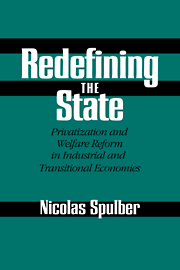Part I - Rationale for the State's Expansion
Published online by Cambridge University Press: 29 March 2010
Summary
Why should a private enterprise economy be subjected to any kind of government intervention and not be left entirely to the guidance of the “invisible hand” of the market? The answers to this often-repeated question have varied enormously through time under the impact of intertwined economic, social, and political considerations and of power relations within the society. Modern conservative politicians, and certain economists, contend that the more limited the economic role of the state, the better off the economy and the population at large. Other economists dismiss this contention and its theoretical underpinnings as unrealistic (as we shall see in Part II). These economists point out that the market cannot perform all the socially necessary economic functions – moreover, that it could not consistently discharge all of them efficiently. As a matter of fact, the state's (i.e., the government's) interventions in the economy have developed historically in a number of ways that could be grouped into the following basic categories: legal and regulatory, allocative, growth-oriented and/or stabilizatory, income distributive.
Building on the foundation of property laws, the first category of activities has consisted of determining the market's legal structure and regulating its processes involving coalitions and bargaining among consumers and firms. As Professor Milton Friedman, an ardent defender of individuals' freedom to choose, has pointed out (in Capitalism and Freedom), government is essential for achieving something that the market cannot do for itself, namely to act both as “a forum for determining the rules of the game” and as “an umpire to interpret and enforce the rules decided on.”
- Type
- Chapter
- Information
- Redefining the StatePrivatization and Welfare Reform in Industrial and Transitional Economies, pp. 1 - 4Publisher: Cambridge University PressPrint publication year: 1997



